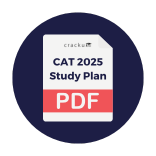Read the following scenario and answer the TWO questions that follow.
Aman has come to the market with Rs. 100. If he buys 5 kilograms of cabbage and 4 kilograms of potato, he will have Rs. 20 left; or else, if he buys 4 kilograms of cabbage and 5 kilograms of onion, he will have Rs. 7 left. The per kilogram prices of cabbage, onion and potato are positive integers (in rupees), and any type of these vegetables can only be purchased in positive integer kilogram, or none at all.
Aman decides to buy only onion and potato, both in positive integer kilogram, in such a way that the money left with him after the purchase will be insufficient to buy a full kilogram of either of the two vegetables.
If all such permissible combinations of purchases are equally likely, what is the probability that Aman buys more onion than potato?
Let the price of one kg of potato be P, one kg of cabbage be C, and one kg of onion be O.
we are given the equations,
$$5C+4P=80$$ (i)
$$4C+5O=93$$ (ii)
In equation (ii), we get 3 as the unit digit on the right-hand side. This is only possible with 8 + 5 on the left-hand side.
So, the unit place value of C must be 2, which means that C can have values 2, 12, 22, 32, and so on. The value of O must be an odd number.
Using this information in equation (i), we can see that the value of 5C will always have 0 as its unit digit. Meaning that the value of 4P must also have its unit digit as zero.
This would tell that P is a multiple of 5.
4P can then only be 20, 40 or 60 for C to also have a positive integer value.
If P is 5, C would be 12, giving the value of O to be 9
If P is 10, C would be 8, and this is consistent with our criteria that the unit digit of C must be 2
If P is 15, C would be 4, which is again not consistent with the same criteria.
Therefore, the price of one kg of potato would be Rs. 5, one of cabbage would be Rs. 12, and one kg of onion would be Rs. 9
The question says that Aman buys only potatoes and onions. The money left after purchasing these must be less than Rs. 5 so that he cannot buy an additional kg of potatoes.
Now, we can buy a maximum of 10 kg of onions, which would cost us Rs. 90, forcing Aman to buy 2 kg of potatoes to meet the above conditions.
So, the number of kg of opinion bought can vary from 1 to 10, giving us a total of 10 possible scenarios. We need to check where the number of potatoes bought in kg outweighs the onions bought.
We see that when Aman buys 7 kg of onions, he also has to buy 7 kg of potatoes. So only when he buys 10, 9 and 8 kg of onions is the weight of onions bought more than the weight of the potatoes bought.
So, the probability that more onions are bought than potatoes would be $$\frac{3}{10}$$
Therefore, Option A is the correct answer.
Create a FREE account and get:
- All Quant Formulas and shortcuts PDF
- 15 XAT previous papers with solutions PDF
- XAT Trial Classes for FREE




